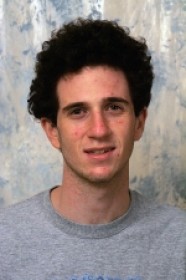PhD Thesis Defense
Coordination of Multiple Dynamic Programming Policies for Control of Bipedal Walking
Event Location: NSH 3305Abstract: Walking is a core task for humanoid robots. Most existing walking controllers fall into one of two categories. One category plans ahead and walks precisely; they can place the feet in desired locations to avoid obstacles but react poorly to unexpected disturbances. The other category is more reactive; they can respond [...]
Search and Pursuit with Unmanned Aerial Vehicles in Road Networks
Event Location: NSH 1305Abstract: Across many rescue, surveillance, and scientific applications, there exists a broad need to perform wide-area reconnaissance and terrain surveys, for which unmanned aerial vehicles (UAVs) are increasingly popular. This thesis considers the task of using one or more UAVs to locate an object of interest, provide continuous viewing, and rapidly re-acquire [...]
Improving Robot Locomotion Through Learning Methods for Expensive Black-Box Systems
Event Location: NSH 3305Abstract: The modular snake robots in Carnegie Mellon’s Biorobotics lab provide an intriguing platform for research: they have already been shown to excel at a variety of locomotive tasks and have incredible potential for navigating complex terrains, but much of that potential remains untapped. Unfortunately, many techniques commonly used in robotics prove [...]
Multi-agent Pickup and Delivery Planning with Transfers
Event Location: GHC 2109Abstract: In Pickup and Delivery Problems (PDPs), mobile vehicles retrieve and deliver a set of items. The PDP is a well-studied, NP-hard problem. Examples of the PDP include mail and courier services, taxis, ridesharing services, and robots such as our own CoBots and CreBots, which retrieve and deliver items for the occupants [...]
Coherent Scene Understanding with 3D Geometric Reasoning
Event Location: NSH 1305Abstract: When looking at a single 2D image of a scene, humans could effortlessly understand the 3D world behind the scene even though stereo and motion cues are not available. Due to this remarkable human capability, one of the ultimate goals of computer vision is to enable machines to automatically infer the [...]
Distributed Algorithm Design for Constrained Multi-robot Task Assignment
Event Location: GHC 8102Abstract: The task assignment problem is one of the fundamental combinatorial optimization problems. It has been extensively studied in operation research, management science, computer science and robotics. In multi-robot systems (MRS), there are various applications of task assignment, such as environmental monitoring, disaster response, extraterrestrial exploration, sensing data collection and collaborative autonomous [...]
Control and Design of Snake Robots
Event Location: NSH 1305Abstract: Snake robots are ideally suited to highly confined environments because their small cross-sections and highly redundant kinematics allow them to enter and move through tight spaces with a high degree of dexterity. Despite these theoretical advantages, snake robots also pose a number of practical challenges that have limited their usefulness in [...]
Perceptually Valid Dynamics for Smiles and Blinks
Event Location: GHC 8102Abstract: Human observers are adept at detecting anomalies in realistic computer-generated (CG) facial animations. With an increased demand for CG characters in education and entertainment applications, it is important to animate accurate, realistic facial expressions. In this thesis, we develop a framework to explore representations of two key facial expressions: blinks and [...]
Design and Control of a Flapping Flight Micro Aerial Vehicle
Event Location: NSH 3305Abstract: Miniature flapping flight systems hold great promise in matching the agility of their natural counterparts, bees, flies, and hummingbirds. Characterized by reciprocating wing motion, unsteady aerodynamics, and the ability to hover, insect-like flapping flight presents an interesting locomotion strategy capable of functioning at small size scales and is still a current [...]
Spatial, Temporal and Spatio-temporal Correspondence for Computer Vision Problems
Event Location: GHC 2109Abstract: Many computer vision problems, such as object classification, motion estimation or shape registration rely on solving the correspondence problem. Existing algorithms to solve spatial or temporal correspondence problems are usually NP-hard, difficult to approximate, lack flexible models and mechanism for feature weighting. This proposal addresses the correspondence problem in computer vision, [...]









